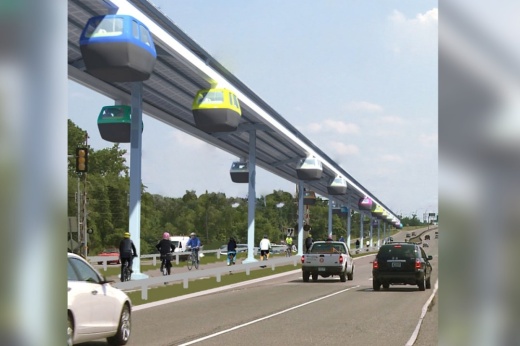These JPods, as they are called, have been likened to a modern gondola system or a tram, but passengers won’t be sharing their ride with strangers (unless they want to). The pods hold four to six people.
The vehicles run on electricity and are powered by solar. The tracks would be built within a roadway’s existing right of way, so there’s no extra land needed.
“I’m intrigued by the technology,” said Gyna Bivens, Fort Worth City Council mayor pro tem, at a September meeting of the Regional Transportation Council, on which she serves as vice chair. “I grew up watching ‘The Jetsons.’”
JPods: Solar-Powered Mobility Networks from Bill James on Vimeo
It’s a technology that has intrigued others as well.
Earlier this year, the Regional Transportation Council approved a new policy called the Transportation Infrastructure Certification Program. The idea is to have experts with the North Central Texas Council of Governments do an initial review of any emerging technologies that might ease traffic congestion. Programs that get certified would then be eligible to solicit interest from local governments that could someday make those technologies a reality.
“These are major transportation technologies that can’t use our roadway system or our rail system,” said Brendon Wheeler, program manager over NCTCOG’s Metropolitan Transportation Plan Team. “They have to build their own system.”
The policy is meant to level the playing field for tech companies that need a testing ground as well as for local governments looking for transit solutions, Wheeler said.
He noted that while tech companies have the private funds needed to finance their projects, they have difficulty navigating the federal environmental review process.
“That’s kind of what we do day in and day out,” Wheeler said of NCTCOG. “We felt we could aid on that side of things.”
In September, the Regional Transportation Council voted to certify two technology providers, JPods and TransPod. Both technologies use pods to transport people. While the TransPod is seeking applications for a multicity or even statewide project, JPods are looking to solve congestion on a more local level.
NCTCOG is accepting applications for possible projects using either technology. The deadline to apply is Nov. 18.
On Oct. 24, Plano City Council directed its staff to submit an application for JPods.
Brian Shewski, Plano’s Transportation engineering manager, said the city is in the early stages, and a lot would have to happen before construction could begin.
“We’re looking at seven to 10 years, of course, in my opinion, before we could actually get this thing operational,” he told council.
City Engineering Manager Caleb Thornhill told council that there is no commitment attached to the city's application. This step simply allows the city to signal its interest and get more information, Thornhill said.
“It is a new technology,” Thornhill said. “They have not deployed anywhere in the country.”
JPods founder and CEO Bill James said his system is cleaner, faster, safer and more affordable than other public transit systems. And it operates somewhat the same way as an existing personal rapid transit system in Morgantown, West Virginia, which celebrated its 50th anniversary Oct. 24.
James said JPods use much more advanced technology when compared with the Morgantown system.
“It’s the same concept of self-driving cars on a grade-separated guideway, but it’s like your 1972 cell phone too,” James said of the Morgantown system.
One of the other differences is that JPods are flipped upside down and suspended from a guideway vs. operating on a track on the ground.
“Next time you get in an elevator and push the button, you’re riding in a vertical JPod,” James said. “These are just a network of horizontal elevators. It’s just that simple.”
Jpods Station Animation from Bill James on Vimeo
James, who is based in Tulsa, Oklahoma, estimated that it would cost between $10 million and $15 million per mile to build a JPods network. Dallas Area Rapid Transit’s 26-mile Silver Line project between Plano and Dallas Fort Worth International Airport carries a $1.89 billion price tag. That works out to about $72.7 million per mile.
James said he has commitments for private funding, so no taxpayer dollars would be used to build the system. He estimates it would take 18-24 months to build and certify a JPods network. The big obstacle, he said, is the regulatory process.
Stations for JPods could be constructed inside buildings or adjacent to buildings, with the smallest being about the size of two parking spaces, according to the presentation to Plano City Council.
As part of its JPods application, the city of Plano must propose a location. Its application will pitch building a network that could transport people in the area south of SH 121 on either side of the Dallas North Tollway among the company headquarters buildings, restaurants and retail areas.
“We’ve also been looking for a way of connecting Legacy West and The Shops of Legacy, all that together,” Plano City Council Member Rick Grady said at the council meeting. “We’ve talked about this for years, and this makes a lot of sense.”
James said any area that is split by a major roadway—like the one in Plano—is a good candidate for his JPods technology. Areas like DFW Airport that shuttle passengers from parking areas to terminals would also be good candidates, he said.
Wheeler said he was not aware of any other agency in the country doing this sort of matchmaking that NCTCOG is doing between tech companies and local governments.
“We’re not able to build enough roads or transit as fast as we’d like to to support the tremendous growth we’re having in the metroplex,” Wheeler said. “So innovative technologies like these can help support mobility, reduce congestion, promote reliability and travel throughout the region. So we’re trying to find every tool in the toolbox we can to support our local governments in meeting those needs.”
Below is a preliminary map showing routes for a possible JPods network in west Plano.





